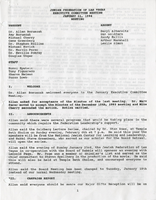Search the Special Collections and Archives Portal
Search Results
Edwin "Tony" Wuehle oral history interview
Identifier
Abstract
Oral history interview with Edwin "Tony" Wuehle conducted by David Schwartz on December 21, 2006 for the Boyer Early Las Vegas Oral History Project. In this interview, Wuehle discusses his early life in Hettinger, North Dakota and his career as an educator. He recalls his first experiences playing poker, participating in home poker games while living in Michigan’s Upper Peninsula, and using a pseudonym as a player. Wuehle then talks about writing a book, founding the Gamblers Book Club Press in Las Vegas, Nevada, and writing for religious publications. Later, Wuehle explains the tension between participating in religion and playing poker. He describes Las Vegas poker rooms during the 1960s and 1970s and shares his thoughts on online poker. Lastly, Wuehle discusses why casinos use prop players and his efforts to organize a poker tournament to raise funds for Bay de Noc Community College in Michigan.
Archival Collection
Las Vegas Jazz Society Records
Identifier
Abstract
The Las Vegas Jazz Society Records (approximately 1975-2003) are comprised of organizational records including meeting agendas, minutes, and membership statistics of the Las Vegas Jazz Society (LVJS). Included in the collection are issues of the LVJS's newsletter Jazz Notes, promotional materials, blank membership applications, correspondence, information on other regional jazz societies, and photographic prints depicting various events and festivals. A portion of this collection documents LVJS's involvement in saving the KUNV 91.5 FM radio station.
Archival Collection
Hal Rothman Faculty Papers
Identifier
Abstract
The Hal Rothman Faculty Papers (approximately 1930-2006) are comprised primarily of research, teaching, and professional papers of Hal Rothman, professor of history at the University of Nevada, Las Vegas (UNLV). The papers include Rothman's research notes, manuscript drafts, conference articles, lecture notes, audiovisual material for his book
Archival Collection
Alan Copeland Music Scores
Identifier
Abstract
The Alan Copeland Music Scores are original handwritten music scores arranged by American composer Alan Copeland from approximately 1936 to 2004. Copeland worked with various musicians and groups, such as Les Brown, the Modernaires, and Sarah Vaughn.
Archival Collection
Las Vegas City Commission Records
Identifier
Abstract
The Las Vegas City Commission Records (1911-1960) is comprised of bound and unbound materials from the original Las Vegas City Commission. Twelve of the bound volumes are minutes that served as the official record of the proceedings of all Las Vegas City Commission meetings from 1911-1960. There are also three volumes of City of Las Vegas ordinances dating from 1911 to 1958, one volume of legal documents from 1944-1945 and two large volumes containing an alphabetical subject index to the topics covered in the minutes. Unbound materials cover the period 1921 to 1946 and include minutes, resolutions, ordinances, correspondence, financial records, proclamations and other documents related to city business. They provide a valuable historical record of a wide variety of business and community activities in Las Vegas in the first fifty years of its incorporation.
Archival Collection
Fred Houghton Papers
Identifier
Abstract
The Fred Houghton Papers (1909-1998) consist of Houghton’s legal and personal files on his Blue Chip Ranch property in Las Vegas, Nevada. The materials include legal cases, maps, reports, and correspondence concerning water access on the property, and his work with the Las Vegas Well Users Association, which primarily contains correspondence in conjunction with Las Vegas's water politics. The collection also contains court cases during the 1930s when Houghton worked as a lawyer in Chicago, Illinois, as well as legal files for his time as a public defender for the State of California. The personal files in the collection primarily consist of correspondence, banking records, diaries, and notebooks.
Archival Collection

University of Nevada, Las Vegas (UNLV) Spring 2017 commencement program
Date
Archival Collection
Description
Commencement program from University of Nevada, Las Vegas Commencement Programs and Graduation Lists (UA-00115).
Text

Transcript of interview with Ruth Gust by Beth Ann Bonenfant, March 10, 1981
Date
Archival Collection
Description
On March 10, 1981, Rebecca (Beth) Bonenfant interviewed Ruth Gust (born 1905 in Mokane, Missouri) about her life in Nevada. Gust first talks about her original move to Las Vegas in 1947 and some of the first businesses that existed at the time. In this brief interview, she also talks about the first casinos, the culinary union, her employment as a server, and Mt. Charleston.
Text

Arturo Ochoa interview, April 9, 2019: transcript
Date
Archival Collection
Description
On the corner of Eastern and Stewart, inside the East Las Vegas Community Center, lies an oasis of creativity and art. The halls ring with the sound of harmonious music coming from the meeting rooms, where children move violin bows up and down in a synchronized motion. They stare with concentration at the music sheets in front of them. They gracefully play together and fill the empty halls with classical music. For most of them, they are the first in their family to learn how to play an instrument. Like many in their neighborhood, they are also first-generation Americans. The students are rehearsing for their recital with the Las Vegas Philharmonic at the Smith Center in a few weeks. In the back of the room there is a man gleaming with pride and joy. The Foundation to Assist Young Musicians (FAYM) provides the rehearsal space, violins, and music lessons at the community center and allows these children to flourish despite their economic, social, or racial background through, “Building
Text

